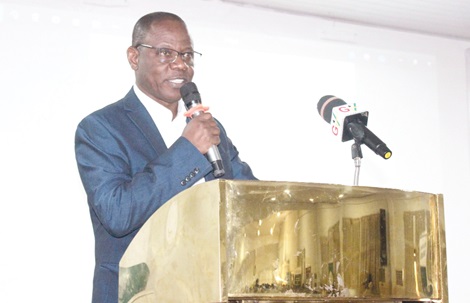
Policy, community engagement critical to better health outcomes — Dr Kuma-Aboagye
The Director-General of the Ghana Health Service (GHS), Dr Patrick Kuma-Aboagye, has said that policy and community engagements are critical elements that will pave way for transformative advancement in public health.
He added that evidence-based social and behaviour change interventions were pivotal in achieving sustainable health outcomes.
“These interventions inform and empower the individual and communities to adopt healthy behaviours to reduce the burden of preventable diseases such as malaria, hypertension, diabetes and tuberculosis, including making the cost of care cheaper.
“The same is evident when achieving universal health coverage which demands collaborative efforts across all sectors,” the Director-General said.
Summit
Dr Kuma-Aboagye was speaking at the Third Social and Behaviour Change summit in Accra on Tuesday.
![]()
Participants
The three-day event is on the theme: Achieving universal health coverage through evidence based social and behavioural change interventions.”
In attendance are representatives of the United Nations Children's Fund (UNICEF), the US Agency for International Development (USAID), the GHS, World Health Organisation (WHO), the Ministry of Health, among others.
Measures
Dr Kuma-Aboagye, however, said achieving such objectives require continuous innovations, technology adaptation and enhanced community engagement to reach marginalised populations effectively.
“By fostering partnerships and embracing innovation, we can create a resilient health system that leaves no one behind.
“While the road to this has financial constraints, infrastructural gaps and socio-cultural barriers, it also presents an immense opportunity.
“Today, we have at our disposal the unprecedented tool of knowledge to catalyse change. It is incumbent upon us all to harness these opportunities and confront the challenges head-on and chart a course towards a healthier and more equitable future for all,” he said.
Dr Kuma-Aboagye further urged stakeholders to advocate policies that prioritised health equity, saying “each of us has a role to play in this collective endeavour, whether as researchers, policymakers, healthcare providers, advocates or the media”.
“Together, let us harness the power of evidence, innovation and collaboration to build a resilient health system that upholds the dignity and well-being of every individual,” he added.
Strategies
Some of the participants called for the establishment of strategies that would ensure that marginalised and underserved populations had access to healthcare services.
They stressed the need to involve communities in the design and implementation of health interventions, and also promoted preventive services and timely intervention to reduce healthcare costs.
Othe areas they deliberated on were the establishment of innovative approaches to social and behavioural change, strategies for advancement of SBC, policy frameworks that supported and sustained SBC efforts and the integration of SBC in public health policies.
